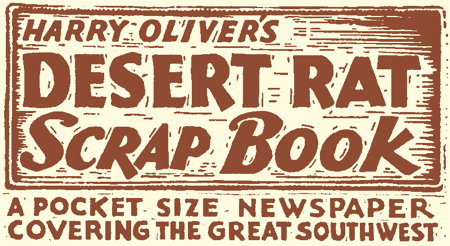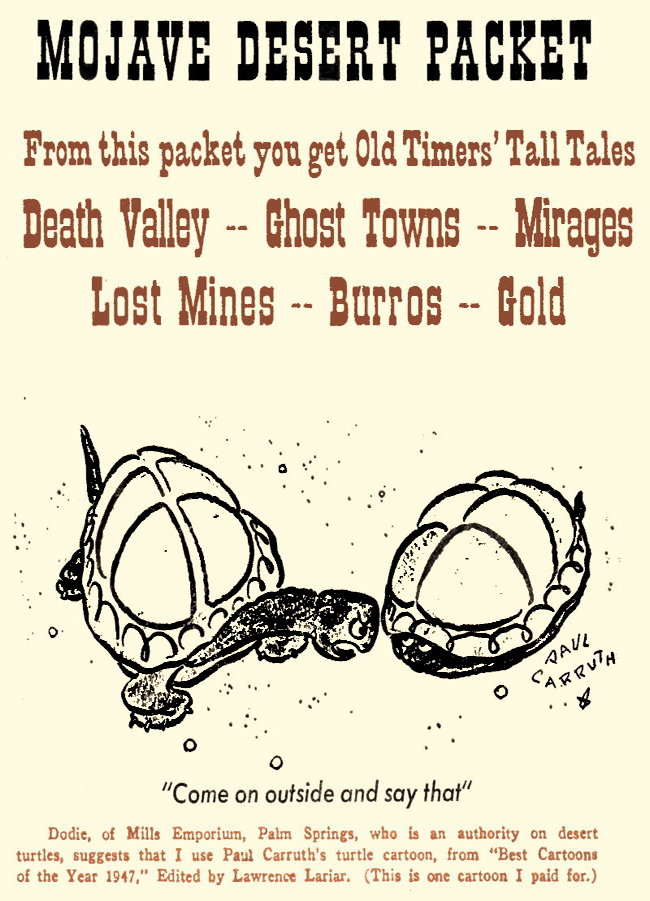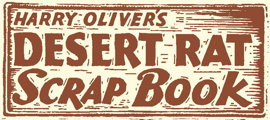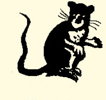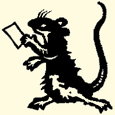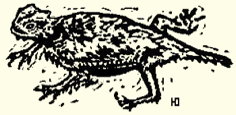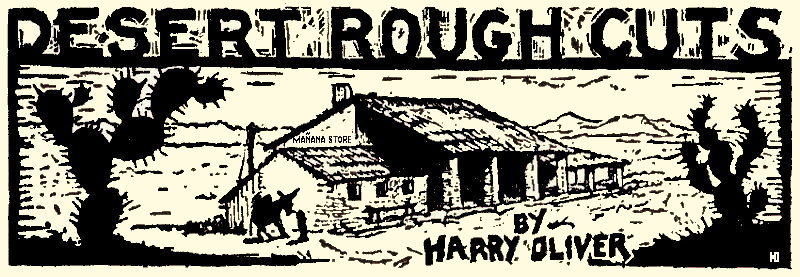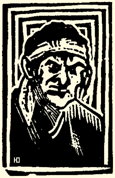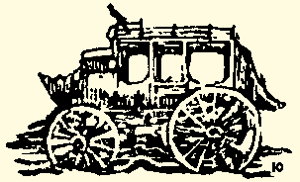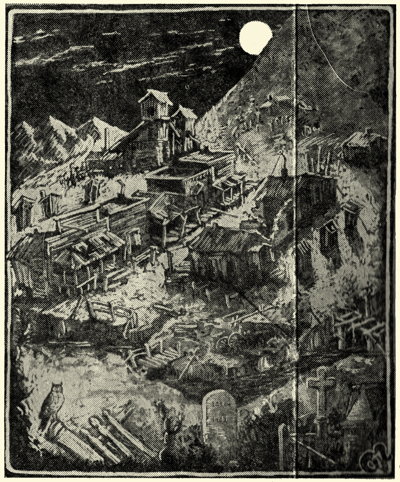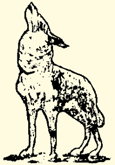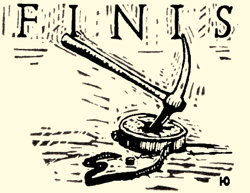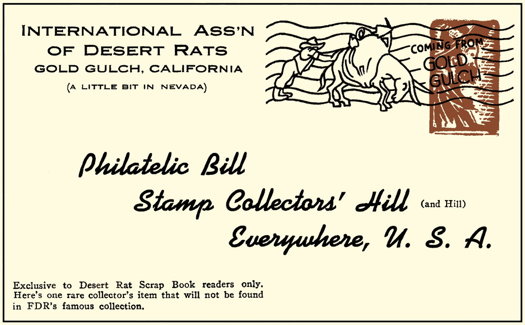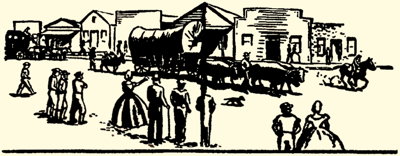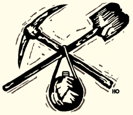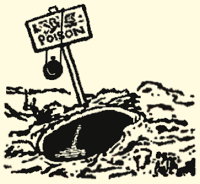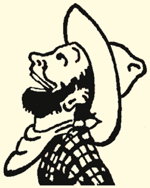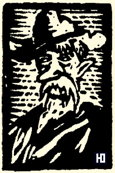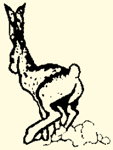BACK HOME COVER THIS IS HISTORICAL INFORMATION ONLY
PRICE 10 Cents . . . . . . . Only one measly thin dime
(A DOLLAR AFTER THE TAES ARE TAKEN OUT
PACKET TWO OF POUCH TWO
PUBLISHED FOUR TIMES A YEAR
Only Newspaper in America you can open in the wind
DESERT RAT SCRAP BOOKPAGE 2
This paper is not entered as 2nd class mail. It's a first class newspaper.
Packet Two of Pouch Two
![]()
Smallest newspaper in the world and the only 5 page one.
Published at Fort Oliver
1000 Palms, California
Four Times a Year
ON THE NEWS STANDS 10¢ A COPY
But sometimes they don't have them.
ONE YEAR BY MAIL — 4 COPIES 50¢
Darned if I am going to the trouble of mailing it for nothing.
10 Years ................... $5.00
100 Years ...................$50.00
Something to think about!
|
Published by H A R R Y O L I V E R Fort Commander |

|
Pictures are by the author, many of them are woodcuts. I did all but the spelling.
![]()
Most of this material, pictures and writing is copyrighted—and branded.
|
THE MAIL |
All newspapers and magazines asking you to subscribe, as a present to a friend, tell you that the one you send it to thinks of you at each mailing—BUT DO THEY? I tell them with your name on the "BEHEST OF" spot. (See page 5 of each number.)
One lady subscriber suggested that I write "Happy Birthday" on the "Behest" line. Seems her uncle accused her of always forgetting his birthday. So four times a year he receives a "Happy Birthday" message and, due to my irregularity in printing, we'll hit his birthday some day, by golly.
BUFFALO CHIPS
(Some folks would call this an editorial)
This little Desert Newspaper is not so different from your hometown paper. Editors all like pleasing signs of appreciation. I'm happy today 'cause I'm fixin' things up for posterity—furnishing hundreds of copies of this paper to be put in corner stones.
I was also pleased this week to see the first copy of this newspaper translated into Arabic for the Arabian Desert Rats. From the last five packets, selected items have been put together, makin' one Packet (pirty type it is); and Don Blanding's poem taken from Packet No. 2 looks like a pattern of fine lace. My woodcuts look the same except for the two they got wrong side up. (It doesn't matter,) but they folded it wrong.
Correction: The foldin' is right — the Arab reads from right to left !
The Editor promises nothing—he can't be sure of the next date of publication. If you pay for an ad for one year you will have it in four packets. Because most of my readers keep their packets, you should not advertise with me if your ad is not for twenty or thirty years. (Just think of your ad waiting in one of those corner stones.)
I'LL SUE YOU IF YOU SELL OUT AND GO INTO THE CHICKEN BUSINESS!
(Not you, Knott.)
I regret I told you of the great number of copies going into corner stones—just suppose collectors, looking for rare back numbers, should take to digging out corner stones to get them.
By this time a lot of you people have taken note that I use my old wood cuts over and over (I am surprised they fit in so many places.)—But I got some new glasses now, so you can look for some new ones soon.
The Editor thinks that the feeling of security that comes with the accumulation of a few thousand dollars must be a wonderful sensation.
[ REMEMBER ]
This is one newspaper people borrow jist t' read.
![]()
The editor boasts, as he sits writing by the light of a coal oil lamp,
That this is not a modern publication.
"When what you have done in the past looks large to you, you have not done much today.
—Elbert Hubbard.A COINCIDENCE
The above was printed in a national magazine two months ago. Because I am printing a quarterly it's a coincidence. We printed it in the same quarter.
Your Alert Editor.
![]()
GHOST TOWN
Ghost Town of Calico should become a public park. As many as 1000 cars have been checked at the Ghost Town on a Sunday. If you live in the Mojave Desert, write the Editor of your home town paper. (Let's all give the idea a play.)
![]()
GHOST TOWNS
and Desert Humor
 Your editor spent two days with Paul Hubbard (The Randsburg Times) and Jules Follenius, old time desert prospector, looking over the Mojave Grost Towns this spring.
Your editor spent two days with Paul Hubbard (The Randsburg Times) and Jules Follenius, old time desert prospector, looking over the Mojave Grost Towns this spring.
Jules is a wizard at telling and getting the Old Timers to tell desert rat yarns. At Goler we heard the story of the two old timers that got a fancy new cook book but weren't able to cook with a cook book because every recipe started with TAKE A CLEAN DISH.
At Garlock the outstanding yarn was the one about the desert rat that after a lucky strike went to Los Angeles, hunted up the swankiest cafe he could find, called to the waiter for six plates of beans and a candle, put the six plates of beans in a row before him. Then he blew out the candle and told the waiter to turn on the light and bring him a big porterhouse steak with all the fancy trimmings they had, saying, "I want those bean to see me eat in style."
Jules told of the desert rat that took a job as summer caretaker at a big Death Valley Hotel and drawing on the large stock of dishes was able to go five months without washing a dish. He was undecided which towel to use, he had three all the same color, a dish towel, a face towel, and one for a mop.
(Gathering stuff like this is sure a nice way to make ½ a living.)
![]()
Pete Osdick was looking into an old mine over at Johannesburg Saturday an' fell in with some folks from Randsburg.
![]()
Colophon:
This issue of the Desert Rat Scrap Book comes from the heart of the Mojave Desert. Both typography and presswork were accomplished in the plant of the Randsburg Times, located in that historic and colorful mining area. Times Editor Paul Hubbard assisted in research for this issue. Production of the Scrap Book was under the direction of co-publisher Bob Hubbard.
Packet 2, Pouch 2 Harry Oliver's DESERT RAT SCRAP BOOK Page 3
OLD TIMERS
Shorty Harris
JACKASS PROSPECTOR
By ROBERT J. SWEM
From the Hobo News
Out in the Death Valley, Calif, where the sun beats down every day in the year, there is a beautiful little monument bearing a plaque which reads:
"Here lies Shorty Harris, a single blanket jackass prospector."
Old time westerners and prospectors spin many yarns about this little, unassuming character who came West after the Civil War in search of gold.
Folks say he was born up around Rhode Island in 1856 or '57—they aren't sure. His father and mother died soon after he was born, and he went to live with his aunt. He wasn't fond of the aunt, and at fourteen ran away and headed west.
Shorty used to boast about the fact that he and President Grant arrived in California on the same train back in '76Ěthe only difference being that President Grant was ensconced on the comfortabe plush cushions of the Presedential Special while Shorty rode directly below on the none to comfortable rods.
For years Shorty could be seen tramping the desert country, from Reno to Bisbee, from Mojave to Salt Lake City—always in the never-ending search for riches that somehow eluded his grasp. There was the time in 1904 when he made a strike around the Bullfrog Hills of Nevada. Shorty sold his discovery for $800 and spent the money on "Juniper Juice," as he affectionately called it. The mine later sold for round $100,000.
Of course, this only proved what most folks had always said about Shorty: He would rather hunt for gold than mine it, and whenever he got his hands on any money he wouldn't know what to do with it, except, perhaps, go on a spree until it was gone.
Shorty's life, however, was not without romance. There was the time when he thought about settling down with some nice woman, and having something running around the house besides a white picket fence. This thought came to him while he was working in a blacksmith shop in Ballarat, a little town in Panamint Valley. A Miss Bessie Hart was the object of Shorty's affections and in his own words, "She was one right pert woman, as women come an go."
This Belle of Ballarat was well over six feet tall and weighed well over two hundred pounds. Rumor had it that she had, on occasion, treated a couple of husky men pretty rough. This seemed to make little difference to shorty, who stood a scant five feet, and tipped the scales around one twenty. He was in love with this desert Amazon, and that's all that mattered.
Shorty was putting an edge on one of his mining picks in the blacksmith shop, and Bessie was pumping the bellows for him, when Cupid let his arrow fly.
"How 'bout you 'n' me gettin' hitched?" said he, suddenly looking up at her.
Bessie straightened to her full six feet and placed here large hands on her none to narrow hips.
"Shorty," she declared, "you're a right nice little guy, and I like you, but as my husband—well, you're just too damn little for a big job."
"Recon mebbe you're right," said Shorty "Will you get them bellows workin' again?
Shorty lived until he reached the age of seventy-seven. When his time drew near, he called his friends to his bedside and requested that he be buried in the country he had known and loved so well.
The spot where they laid him to rest in Death Valley is the deepest grave ever dug in the soil of North America—280 feet below sea level.
And Shorty would be proud and happy if he could rise up and say:
"Well, if I ain't in hell, then I'm closer to it than anyone else in the world!"
![]()
 O'Brien, O'Brien & O'Brien Shortcut Diggins
O'Brien, O'Brien & O'Brien Shortcut Diggins
Red-headed Shorty O'Brien, prospector of Mirage Lake, California, got mad at two roosters. They used to roost wrong end round on the seat of his truck, so he tied their legs together and took 'em for a thirty-five mile ride to his mother's and turned them loose with her chickens. When he got home at day-break he was surprised to see his two roosters roosting on the rear axle, none the worse for their seventy mile ride.
It was Shorty O'Brien that discovered gold when he was building a short cut to his shack, he calls his mine the O'Brien, O'Brien and O'Brien Short Cut Diggins.
"The Irish never change their names—they're too proud of them."
SCOTTY WINS BET; OUTLIVES JOHNSON
BY George Pipkin in Trona Argonaut
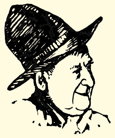 With the passing of Albert Mussey Johnson, Walter Scott, née Death Valley Scotty lost his gold mine, but won a bet. His bet was that he would outlive his partner, Johnson, who he affectionately called that "old so and so." They were both of the same age, 75.
With the passing of Albert Mussey Johnson, Walter Scott, née Death Valley Scotty lost his gold mine, but won a bet. His bet was that he would outlive his partner, Johnson, who he affectionately called that "old so and so." They were both of the same age, 75.
Johnson was born with a gold spoon in his mouth. His father, and eastern capitalist, founded the National Insurance Company of Chicago, besides being the biggest stockholder in the Santa Fe Railroad. He had other vast holdings that helped create his fortune. It is said that when his son Albert reached the age of 21, he inherited 100 million dollars. While others are more conservative and say that he only inherited 40 million. Anyway Johnson had money to throw away and he threw a lot of it to Scotty. During the depression of the early thirties, Johnson almost went broke, his fortune dwindled to a mere six million.
Around the turn of the century Johnson was seriously injured in a train wreck. When he was able to travel in 1902 he was sent to the desert to convalesce. There he met and hired Scotty as a companion and guide.
Soctty, being a showman and a promoter, had the ideas, and Johnson had the money. By combining the two, Scotty became famous, Johnson didn't do so bad himself, but nobody paid any attention to what he did. Outside the church world, few people realized that he contributed great sums of money to different religious organizations. Among his benefactors were Angelus Temple and the Bible Institute of Los Angeles. It is claimed that his money built Angelus Temple.
He liked to emulate Scotty in a small way. Dressing in cowboy garb, with two guns swinging from his hips, he would swagger around the castle in great style.
Harry Porter and Johnson were friends for 40 years. Harry said that he was a crack shot. One time he rode a mule up the moutain to visit Harry. While he was there a pack rat ran across the cabin floor, and Johnson drew his six shooter and shot the rat's head off.
Johnson ha been deputized by many counties, and he got a kick out of wearing the badges under the lapel of his coat. He had so many badges that they overflowed to the lining of his coat. He also had a permit to carry a gun in Mexico. A governor of Nevada once created a State Highway police patrol and presented Johnson with a gaudy uniform. He was the only member of the patrol strictly honorary. His latest projet was placing a modern sewing machine in every Mexican village while sowing seeds of religion.
Scotty did not attend Johnson's funeral. The last funeral he attended was that of Mrs. Johnson. He said then, that that was his last funeral until he attended his own.
![]()
NEVADA
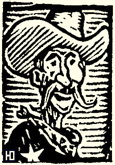 They Tell 'em in Las Vague Goose City
They Tell 'em in Las Vague Goose City
A portrait of Slim Law, cut with not too sharp a chisel, on the butt end of a piece of Desert Smoke Tree Wood
In the Valley of Fire near here, Slim Law told me of a wonderful echo. "When folks camp here," he said, "they go to their beds, give a good shout and the echo wakens them up in the morning."
The only sound that does not echo, even under the most favorable conditions, is a good old hiss.
A Hollywood star has a ranch near here. He hired a man to exterminate the rattlesnakes on his place; said he wan't scared of them but didn't want them to HISS him.
![]()
CAPTAIN ASHBY SAYS
You can get rid of Devil grass by digging it up by the roots, burning it, locking the ashes in a steel safe, and sinking the safe in the middle of Salton Sea.
![]()
Never put off a hard job till tomorrow. Put it off for good.
![]()
In the 197 season, California deer hunters killed 47,173 bucks.
![]()
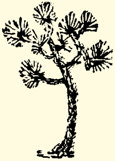 Smart of God to plant the Joshua Tree in the Mojave Desert. (It don't bend and make people think the wind is blowing.)
Smart of God to plant the Joshua Tree in the Mojave Desert. (It don't bend and make people think the wind is blowing.)
(The Editor gives himself 4 stars for this one.)
Too Honest Charlie Misses Heaven
From the Editor's book Desert Rough Cuts, A Haywire History of Borego Desert, (Out of print ten years.) These are the yarns the old keeper of the "Busy Bee" store told.
![]()
Too-Honest Charlie had been a glum-lookin' hombre ever since the first day he showed up in Borego, but we had got kinda used to that. This day he come into the Busy Bee store packin' a grin three feet wide an orders twelve cans of milk.
Then in a little quieter way he asks me to take back a small can of blastin' powder he'd bought about three weeks ago. I was quick to oblige, an' didn't even ask any questions, but I know there was something behind it, because he'd acted awful queer the day he bought that blastin' powder, which ain't Charlie's way. We ain't knowin' Charlie long, but we know he's a fine, square-shootin' hombre.
It warn't long after he arrived in Borego that we found out the real reason for him showin' up out here in the desert. Seems that one day in the city he woke up to the fact that he's always been to honest, believin' so much in people that he figures they're all like he is.
He lived about like all the folks in the city, havin' a job to go to every day, and a car to go to it in, an' especially he had a swell red-headed wife waitin' at home for him.
Well, everything was fine till he met up with a bald-headed friend with a big nose an' a mouth so small he had to live on split pea soup. I been fooled on a nose myself, but Charlie shoulda known better'n to trust a fellow with a mouth no bigger'n that.
Anyway, Charlie was nice to him, till he found out sorta accidental-like how his wife had gone him one better an' been even nicer to the hombre.
The rest of it was kinda like most of them stories, an' as we ain't interested in the way the folks in the city keep on a sinnin', I won't go into that.
Anyway, Too-Honest Charlie ended up out here in Borego, an' if hes been a glum old sober-sides, who wouldn't be packin' around a load of hurt like that?
It was this way about that blastin' powder he bought. Too-Honest may not always tell everything he knows, but when he tells you, you know it's the truth.
He'd got downright melancholy, livin' alone in his cabin on the flats. He'd been dependin' on this time-heals-all philosophy, but what kept knockin' at his mind was that time heals all right, but it heals the conscience of the guilty hombre a lot faster than he heals the fellow that gets hurt. An the iea kept laughin' at him, an' it laughed at hk night an; day, till he decides its tije to quit this world where things s=don't work like the Bible says they do, an' wantin' to get out the fastest way he can, he thinks of blastin' powder.
He sets out a few papers with a note tellin's me to give his books to Cap. Ashby.
After plantin' the keg of powder under an old wagon seat in the long afternoon shadows by his cabin, he makes himself comfortable there, his pipe lit, an' short fuse at his elbow—all ready to take off, but not thinking of what kind of a landin' he was goin to make.
He figures he's got time to watch one more sunset before he goes, an' he decides to smoke his pipe down to the last coal an' then lite the fuse with it.
Well, it comes to him, while lookin' at the purple shadows of the mountains an' seeing for the last time the friendly shapes of desert plants, that if Burbank, while still here on earth, was able to talk to God out of puttin' stickers on cactus, then maybe he, when he arrives up there, an' bein' right on the ground, could fix up theis time-healin' thing so the guilty fellow would get the worst of it.
It's then he hears a flivver an' up comes Joe to ask him can he leave Familiar with him. Familiar is a hound bitch and she's the mother of most of the good huntin' dogs in Borego Valley.
Too-Honest can't say he's got any good reason not to keep her 'cause his suicide reason ain't too good, and he knows it. So he postpones the sailin' date an' gets the dog its supper
A few days later there's eight more dogs in Borego an' Too-Honest is too busy to think of much beside them pups. As they grow they get into all kinds of mischief, an' Too-Honest, bein' a thinker, commences to realize that the most ornery ones are the ones he likes the best. He figures he likes them best because they've got enough gizzard to take a chance.
A'studyin' them he discovers that you just naturally like the kind that go an' help themselves instead of whinin' about things. An' he calculates that maybe that's the answer to this heals-all business. Durned if I don't agree!
I'd a mind to tell him so, but was called to wait on another customer, and when I come back around the corner, kinda sudden-like, I sees the old boy, with a puppy-like twinkle, edgin' pretty close to the Widow Winchester.
I overhears him explainin' that he's only fifty an' never had the rheumatism.
Pickin' favorites in that litter put some not-too-honest ideas in Too-Honest's head.
So I steps up, an' takin' time by the forelock suggests he trade that blastin' powder for one of them fancy packages of face lotions that the Widow Winchester'd been admirin' but always said she couldn't afford.
He seems to think it's a good idea, so we makes the trade, with Too-Honest takin' his chance in the flea-soap for the pups.
![]()
Dry Camp Blackie
SOUSE OF THE BORDER
A sheepherder sent Dry Camp Blackie a letter addressed "Blackie, Souse of the Border, Care Fort Oliver, 1000 Palms."
That was 3 months ago, and Blackie took off and I haven't seen him since (just as I was going to press.)
Lucky for me, the Editors from all over the Mojave Desert sent in so much good stuff for this Mojave Packet. Why, I don't need Blackie more'n Custer needed another Indian. (And a 1/5 lasts almost twice as long.)
![]()
FORT OLIVER
is wonderful. . . . Ain't got no DDT to kill the wild bees . . . ain't got no 2, 4-D (weed killer) to kill the wild flowers . . . and it ain't got no A-bombs to kill the wild burros.
Yep, just good old unpolluted sunshine.
![]()
Pat Garrett's Grave
Las Cruces, New Mexico
The grave of Sheriff Pat Garrett who killed Billy the Kid is littered with bottles, weeds, and trash, and should be cleaned up, says a reporter for the Las Cruces Sun-News.
Page 4 Packet 2 of Pouch 2 -- Mojave Desert Packet
This Page is Dedicated to the World's Greatest Optimist---The Desert Prospector
Harry Oliver's
DESERT RAT SCRAP BOOK
It is an ill wind that does not blow some good. It took the Marshall Plan to call attention to the poor starving Navajo Indians.
Phat Graetinger
The Desert Sun—Palm Springs
![]()
GALLUP, NEW MEXICO—Nation-wide response followed reports of the plight of the Navajo in New Mexico and Arizona, reports Bert Pousma, managing director of Navajo Assistance, Inc. Contributions came from 43 states, Hawaii, Alaska, Columbia, Venezuela and Paris, France. Several donations came from ships at sea. Gifts of $13,903 in cash an 271 truck loads of food and clothing were received and distributed for Navajo relief.
![]()
REMEMBER
FIFTY YEARS AGO
Ladies wore bustles.
Operations were rare.
Nobody swatted the fly.
Nobody had appendicitis.
Cream was 5 cents a pint.
Canteloupes were muskmelons.
Advertisers did not tell the truth.
Milk shake was a favorite drink.
You never heard of a "tin lizzie."
Doctors wanted to see your tongue.
The hired girl drew one-fifty a week.
Farmers came to town for their mail.
Nobody "listened in" on a telephone.
The butcher "threw in" a chunk of liver.
Straw stacks were burned instead of baled.
There were no sane Fourths, no electric meters.
Jules Verne was the only convert to submarines.
Publishing a newsletter was not a business.
You stuck tubes in your ears to hear a phonograph and it cost a dime.
Clipped from The Pony Express
See ad on page 4
![]()
Victorville's Mirage
The Mojave River as it flows north by Victorville from the San Bernardino mountains toward Death Valley, is one of three such rivers in the world that flow UP the globe to the north. The Mojave River, for this reason, is called the "Upside Down River"
![]()
The WELLS FARGO HISTORY ROOM, located in the bank's building at 30 Montgomery St., contains relics of pony express and covered wagon days; an original Hangtown stagecoach; early western franks and postmarks, firearms, pictures and documents.
Open to visitors 10 to 3 daily, 10 to 12 Saturdays.
WELLS FARGO BANK & UNION TRUST CO.
San Francisco
Established 1882
The All Year Spot of the Desert
DESERT BEACH
SALTON SEA
PLAY...In the Sun - In the Water and Under the Wind

250 Feet Below Sea Level
Salton Sea...A beautiful inland body of salt water...area 306 square miles, 250 feet below sea level. Its salt content is twice that of the ocean...Its surface the fastes motor boat course in the world.
Swimming and Boating
Desert and Seashore Homesites
9½ Miles East of Meca, California
GOLD
PAUL SMITH
of the
MUSEUM OF MEMORIES
VIRGINIA CITY, NEVADAHas burro tracked off to the gold diggins at Coloma, Californaia where Jim Marshall discovered the first gold in California. Send him a dollar bill and he will ship you a genuine gold nugget in a Gold Discovery Package. A real Centennial gift and souvenir. Have some sent to your friends in the East.
PAUL SMITH
(NUGGET BOX)Coloma, California
By BEN BEAN
Plug Stewart's the best shot in this desert. But, first, I'd better tell you how he got his trainin' — or, better yet, I'll tell you Plug's whole story.
He used to live in a frame shack at Squaw Springs on the east side of Red Mountain, and would go outside an' do a little prospectin' summers. He had to do what Uncle Sam told him an' come back to Red Mountain to do his assessment work winters.
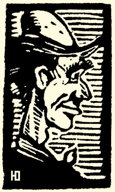 His cabin would fill with rats in the sumer, an' when he got back he would start gettin' rid of 'em. Plug didn't use no traps or p'ison. He used to shoot 'em blind—that is, bein' a sport, he'd give 'em a break an' shoot into the walls where he thought they was from the sound o' their scamperin' feet, dependin' on his luck.
His cabin would fill with rats in the sumer, an' when he got back he would start gettin' rid of 'em. Plug didn't use no traps or p'ison. He used to shoot 'em blind—that is, bein' a sport, he'd give 'em a break an' shoot into the walls where he thought they was from the sound o' their scamperin' feet, dependin' on his luck.
Well, this summer he hits it lucky diggin' out a pocket of wire gold after tracin' it up a canyon for four months. He comes back with a load o' Jack, builds a fine 'dobe cabin, gets hin a new stove an' one o' them radio outfits, drifts another twenty feet, lays in supplies an plans to hibernate for a comfortable winter.
But he misses the rats in those solid, honest, 'dobe walls—just couldn't be happy without 'em. One night, not thinkin', he gets sore at an announcer's cheap line of propaganda an lets go at the new radio. The bullet went right through her an' only changed the station. (That's how he found how to get them cowboy singers.)
He was smart enough to know of he kept shootin' at the radio it would quit talkin' altogether, so he takes an old cast iron flapjack griddle, paints a target on it and hangs it on front o' the place the noise comes from.
He was O.K. while the cowboys was singin' but when those dudes got to wastin' hours atellin' him how an' what to think, it's then Plug done his fine shootin'.
It weren't long till old Plug gets to studyin' the talk comin' out'a that radio, shootin' the rats what's trying to sell propaganda to folks afore they know it. He gets to thinkin' about propaganda, thinkin' how when he was a boy people used it, sayin' "The only good Indian is a dead Indian." (first propaganda he ould remember). And, as he sat listenin' to that radio, he thought back to the days of the war, when the greatest work in propaganda was that line, "England will fight to the last Frenchman." A powerful bit of propaganda that did so much to break the French morale.
Plug's shot a lot'a communists telling that they wasn't communists, but atallin' Plug he should be one. Plug says the Jew tells you, with an accent, that all the great things in America's been done by newcomers. But he says their big mistake is usein' one word that they call each other, keepin' alive that word "Kikes." Says it has more power than paragraphs of propaganda.
Plug can spot a phony politician, an' almost tell when he is reading from a speech that someone else has written, promisin' somebody else's promises.
He says the constructive propaganda for the Negro is killed by cheap colored quartets singin' songs with double meanin's an' filth.
He says there is some that has gained much from propaganda. Says that years of Scotch jokes help business firms with Scotch names. Seems people want thrift on both sides of a business deal.
The Irish, Plug says—the smilin' Irish, have lots to thank propaganda for in song and story alike.
Plug points out that in the West people talk in a much lower tone of voice, so will never fall for the loud talk of Jersey an' Brooklynites. Says Wapter Winchell is liked by more people in the East than the West. (Will Rogers was loved by all.)
Hitler said if you say a thing enough times people will believe it. Plug says he may have been right, but what of the propaganda we hear too much of, told us by people that scream it over and over again in a manner that makes us wonder if they believe it themselves.
Plug says he thinks maybe things sound different out here in our clean desert, away from the loud noises of the city. Anyway, practisin' like this has made Plug the best shot in these here parts, and he can smell propaganda whether it's on a seed catalog or in the middle of a well planned radio script. Plug says it's a great game (more fun than fishing.) Try it, he says, but be sure you have a thick old cast-iron flap-jack griddle hangin' over that noisy propaganda Doodle Bug.
![]()
Russ Nicoll (prince of the date industry), as a kid helped build the St. Charles Hotel in Johannesburg.
![]()
We Ship 'Round the World
Just Send us YOUR GIFT LIST and . . .
WE DO THE REST
Dates from America's Desert Oasis
Coachella Valley, California
VALERIE JEAN
DATE SHOP
Readers Digest found Russ Nicoll. You Write to
him, THERMAL, CALIF.
MIRAGE . . . IN DEATH VALLEY
By GEORGE PIPKIN
George Pipkin is a faithful chronicler of desert lore. He and his good wife, Ann, are typical desert hosts and their knowledge of the Panamint Valley and its environs is mighty helpful to visitors. They operate Wildrose Station just inside Death Valley National Monument.
Have you ever seen a fantastic mirage on the desert? If you haven't, keep looking and some hot summer day you may be rewarded by seeing a beautiful lake, a green forest, medieval castles, a flashing waterfall or some other object that will thrill you. It may be weird or it may be beautiful.
Many people have seen ships, marching soldiers, herds of buffalo and one man once saw a twenty mule team riding top dark storm clouds gathered over the Funeral and Black Mountains on the western boundary of Death Valley. A mirage of this kind will never be seen again, for now, twenty-mule teams are extinct.
I know that this man (whose name I do not know) saw this phenomena, for he photographed the mirage.
The unknown photographer made the picture in the Amargosa Desert of Nevada in November, 1905. It was at that time, perhaps the first recorded picture of a mirage in the history of the photographic art.
![]()
"The Amargosa Desert has an elevation of 4,000 feet above sea level; the Funeral Range, shown in the middle background is from 5,000 to 7,000 feet above sea level, while Death Valley to the west of this range is from 200 to 300 feet below seal level.
West of Death Valley is the Panamint Range, the principal mountain being some 12,000 feet in elevation. The borax company maintains a road from the mines in Death Valley to Dagget Station on the Santa Fe Railroad about seventy miles distance. The following suggestion may be used as an explanation of the phenomena. It is described as being mirrored "somewhere in the Panamint Range" at a high elevation, as the team made its way along the lower or southern portion of the valley, 125 miles south and east of the point where the photo was secured. From the Panamints this mirrored image was deflected by refraction to the cloud bank gathering over the Amargosa and driven by the gathering storm. This cloud bank was, it may be assumed, at a slightly lower elevation than the Panamint Mountains, was gathered over the funeral Range and the Amargosa and could be plainly seen with the naked eye for about 20 minutes; sufficient for the writer to drive nearly a mile, secure a camera and snap the view, then at least forty miles distance, while the team itself must have been at least 100 miles distant. The combination of atmospheric effects and light made it possible to secure, with a 3x5 camera, a picture that is unique and of general interest to admirers of the art."
Some people upon seeing the pictures are inclined to be skeptical of its authenticity. However the photographer has State Senator Charles Brown of the Shoshone to vouch for the picture. Senator Brown, in 1946, told Ralph Merritt that the picture was authentic. He said that the team was that of an ore wagon, standing on a street in Rhyolite, the team belonged to Harry Moon of Rhyolite and was used in freighting from the Keane-Wonder mine, over-looking Death Valley in the Funeral Mountains. Senator Brown said that several prospectors also saw the mirage at the time.
A copy of this unusual picture may be seen at Wildrose Station.
MIRAGE
Dancing on the grey sands,
Dancing on the white.
Painting pretty pictures
With my colors bright.
Now it is a mountain,
Now a lake of blue,
Now a flashing waterfall
Beckoning to you.
When your heart is weary,
And you feet are lead,
And the brazen sun god,
Beats upon your head.
There before your tired eyes
Quick I spread a pool
Thick beset with palm trees,
Filled with water cool.
Now your pulses quicken,
Now you forge ahead.
Here you'll make your bed,
But mirage is laughing,
Laughing at you, Fool,
For you'll die in hot sands
Where I made a pool.
—R. Wendell Hastings
(from Desert Magazine)
PIONEERTOWN
Roy Rogers and the Sons of the Pioneers, (both names familiar to radio and movie audiences) have a sign painter doing a fine job with signs so characteristic of the days of '49. She's got Pioneertown's Main Street looking like a "Frederik Remington" painting. Miss Stone, "girl sign painter," (who rides a mean saw horse) is doing the job.
![]()
BRAND NEW RELIC
The ax is a tool of romance. From earliest history on down through the Stone age, the Bronze age and the Iron age, and more especially during the time of America's early pioneers, the ax has been the indispensable friend of man. And it is the one thing most liable to be left when moving camp.
"Curly" Carroll has an ax he's mighty proud of, claims it came across the country with his grand-pappy in a covered wagon. In asking him about it I commented on the ax because it seemed as good as when his grand-pappy bought it. "Well," replied "Curly" after a thoughtful pause, "It's had three new blades and five new handles, but excepting for that, she's just the same, sir, just the same."
![]()
Death Valley Scotty ante-dated the New Deal in the lavish spending of somebody else's dough.
Brewery Gulch Gazette, Bisbee, Arizona
Not a one of these names or places is COINCIDENTAL.
T H I S I S I T !
ONE YEAR $2.00 Grubstaker: The late Scotty AllenSINGLE COPY 25¢
THE PONY EXPRESS
STORIES OF PIONEERS AND OLD TRAILS
ADOBE
SANTA FE, N. M.—Cristo Rey Church in Santa Fe, constructed in 1940 with native labor as a memorial of the 400th anniversary of the arrival of Coronado in the area, is declared to be the largest adobe structure in the Southwest. The building, erected under supervision of Archbishop Gerken, is 360 feet in length and required 180,000 hand-made adobe bricks. Native timber was used for the massive ceiling beams, some of which weigh 2500 pounds. The carved stone altarpiece, weighing 225 tons, is one reportedly given to the Catholic church by Captain-General del Valle in 1761.
![]()
The Desert Museum at Randsburg is located on a lot originally property of the late Jo P. Carroll, veteran mining editor of Randsburg and Mojave. His reporting was done the hard way, on foot from prospect to prospect from Randsburg to Mojave. The power of the press which he exercised in telling the story of George Holme's discovery of the Golden Queen at Mojave made mining history for the Mojave Desert and several millions for the Holmes. Jo P.'s plug hat is one of the relics at the Desert Museum.
—Randsburg Times
![]()
"Died of Thirst" proclaimed the crudely painted epitaph on an upended boulder that marked a nameless grave near the Trona-Randsburg road near the "Y." Now it's gone, probably prey to a thoughtless souvenir hunter. The stone marked the last resting place of a mule skinner who was found dead at the spot many years ago by a search party that went out to look for him after he failed to arrive from Randsburg with his 20-mule team load of freight. The hapless victim had apparently attempted to disentangle the harness on the mules, and somehow died in the process. For many years a white picket fence marked the grave. The fence was destroyed by an exodus of Hindu laborers who were leaving Trona after having worked on building of the Trona Railroad. Later a wag buried a pair of old boots on the grave, with only the toes sticking out of the ground. Still later the "Died of Thirst" stone appeared. Now the grave is unmarked.
—Trona Argonaut
![]()
HERE'S ONE OLD TIMER
Old Timers in the Indian Wells Valley seem to go right on living. It is that kind of a climate. One of the oldsters, reputed to be 105 years old, was interviewed by a reporter.
"What do you think about women?"
"To tell you the truth, Mister, I quit thinking about women two years ago"
![]()
Walter Knott (of Ghost Town fame) pioneered in the Mojave Desert, and can show you many interesting relics of those days.
![]()

☆☆☆☆☆☆☆☆☆☆☆☆☆☆☆☆☆☆☆☆☆☆☆☆☆☆
Men Who Built the West Wore
LEVI'S
Reg. U. S Pat. Off.
America's Finest Overall
Since 1850
☆☆☆☆☆☆☆☆☆☆☆☆☆☆☆☆☆☆☆☆☆☆☆☆☆☆
PIONEERTOWN
"Where the Old West Lives Again
RANCHO SITES___1¼ ACRES
For Free Descriptive Folder WRITE
Pioneer Land Company
8501 Sunset Boulevard
LOS ANGELES, CALIFORNIA
ONE TUNNEL
. . . ONE LIFETIME
By Paul Hubbard, Randsburg Times
High in the El Paso Range, in the upper reaches of Mesquite Canyon, twelve miles west of Randsburg, in the living exponent of persistence, William Schmidt, better known to desert folks in that asrea as "Burro" Schmidt, 80 year old recluse, "Burro" spent forty years of his life accomplishing one thing—hand-drilling a half-mile tunnel entirely through a mountain.
Over that period he worked in the Kern River Valley on farms, accumulating "beans" for the winter at his mine. Regularly each fall he appeared in Johannesburg with his burros and loaded up supplies at the Teagle's Store. In 1937 his tunnel was finished and the accomplishment received national publicity. Photographs of the tunnel, of his burrow and of "Burro" Schmidt appeared in daily press and international mining journals. Single jack and drill steel and "Burro" Schmidt were the combination that did the job — no compressed air or gasoline motors.
As he nears the end of the trail, happy in having completed a lifetime undertaking, he proposes to offer his tunnel and the story of mineralogy it tells to a Califonrnia university. It will be a natural laboratory for the new generations who want to know the story of the rocks. It is a noble gesture from a nobleman of the desert hills.
![]()
Western Books
![]()
Mexican "Greasers"
Back in the early California Rancho days when the squeak of the Careta (Mexican two-wheeled cart) got too loud, a man on foot would dash up and pour tallow on the wooden axle.
This was how the gringos came to call the Mexicans "Greasers."
I got this from a book just off the press
L E E S H I P P E Y ' S
It's an Old California Custom
$3.00
THE VANGUARD PRESS, NEW YORK
Be sure to read it!
![]()
EARTHQUAKE STORY
from "MY L.A."
by Matt Weinstock
$3.00 at your bookseller
A woman spent the afternoon of Sunday, June 18, 1944, prettying the family burial plot of an Inglewood cemetery. She was tired when she finished—so tired that she overcame her natural objections and sat for a short rest on a headstone in the next plot. At that moment, the quake which centered in the Inglewood area almost moved the headstone out from under her. She didn't realize what was happening and had a few bad minutes. She'll never sit on another headstone.
You will find Matt's book the gayest and wisest, the most readable and accurate story of Los Angeles ever written.
1 0 1 A D V E N T U R E S O F
PANAMINT PETE
Short, Short Gems of Salty Desert Humor

We think that you will like Pete!
$1.50 plus Sales Tax
(Postage Prepaid)
Mail Orders toTHE RANSBURG TIMES
RANDSBURG, CALIFORNIA
Southern California's Only Mining Camp
Home of the Desert Museum
How To Get Along In Mexico
Is JUST ONE of the many interesting bits of information contained in
SONORA SKETCH BOOK
by JOHN W. HILTON
(Illustrated by the author)Chapters have such titles as:
The Love Life of the Jumping Bean
The Social Aspects of Carrying Water
The Illiterate Book Seller
The Begger Who Smelled Like Violets
John Hilton will Personal Autograph
your copy if ordered throughHilton's Art and Gem Shop
THERMAL, CALIFORNIA
DESERT RAT SCRAP BOOK 5
OLIVER TWISTS
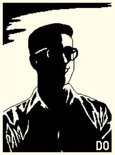
All text was hand-entered (no OCR scans) by Dick Oakes who did the layout, markup and graphics reproduction (all of Harry's misspellings retained). The contents remain the property of Bill Lincoln and his heirs.
